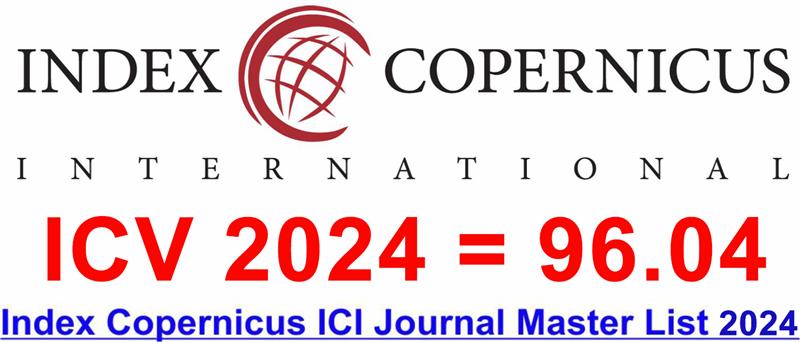Influence of Transformational Leadership on Job Performance in the Education Context - A Review
DOI:
https://doi.org/10.60072/ijeissah.2024.v3i01.008Abstract
The purpose of this study was to conduct a systematic review of existing empirical investigations on the influence of transformational leadership on job performance within the education context. A systematic literature review with a meta-analysis has been executed, focusing on the following objectives: To develop working definitions for transformational leadership and job performance, to discuss the influence of transformational leadership on job performance in the education context and to investigate gaps regarding the influence of transformational leadership on job performance in the education context. By thoroughly analysing the definitions of the two concepts working definitions were developed for both. Two prominent databases, Google Scholar and ResearchGate were utilized to locate relevant literature and review the existing empirical investigations related to formal education. Initially, 54 articles from 2018 – 2023 were referred, and after screening only seven were systematically analysed as the research sample. The review found that transformational leadership in the context of education significantly influences job performance. The gaps that were investigated include conducting longitudinal studies, applying triangulation techniques, analysing additional variables, increasing sample size, and broadening the scope to include diverse population groups and sectors. The findings will assist educational leaders in understanding the significance of the phenomenon and potential benefits. Through meta-analysis, future research has highlighted the influence in colleges of education and specialized schools for individuals with disabilities.
Keywords:
Education, Influence, Job Performance, Transformational LeadershipReferences
Adesemowo, P. O., & Sotonade, O. A. (2022). Basic of education: The meaning and scope of education. Olabisi Onabanjo University.
Ahmad, M. S., Bakhsh, K., & Rasool, S. (2019). Effect of Transformational Leadership Skills on Teachers’ Performance at Secondary School Level in Punjab. Journal of Managerial Sciences, 13(2), 1–9. https://www.qurtuba.edu.pk/jms/default_files/JMS/13_2/01- 01-09.pdf
Al-Harthy, F. N., Nor, P., & Yusof, A. (2016). The Impact of Transformational Leadership Style on Employee Job Performance: The Mediating Effect of Training. International Journal of Science and Research (IJSR), 5(6), 499–503. DOI: https://doi.org/10.21275/v5i6.10616021
Alzoraiki, M., Ab. Rahman, O. bin, & Mutalib, M. A. (2018). The Effect of the Dimensions of Transformational Leadership on the Teachers’ Performance in the Yemeni Public Schools. European Scientific Journal, ESJ, 14(25), 322. DOI: https://doi.org/10.19044/esj.2018.v14n25p322
Amalia, K., Komariah, A., Sumarto, S., & Asri, K. H. (2020). Leadership in education: Decision- Makingin Education. 3rd International Conference on Research of Educational Administration and Management (ICREAM 2019), 400. DOI: https://doi.org/10.2991/assehr.k.200130.155
Astuty, I., & Udin, U. (2020). The Effect of Perceived Organizational Support and Transformational Leadership on Affective Commitment and Employee Performance. Journal of Asian Finance, Economics and Business, 7(10), 401–411. DOI: https://doi.org/10.13106/jafeb.2020.vol7.no10.401
Augustrianto, A., Rahayu, A., & Adi Wibowo, L. (2018). The Effects of Culture on Employee Performance (A Study in The Agent of Tele Account Management Unit, PT. Telecommunication Indonesia Regional VII Makassar). International Journal of Engineering & Technology, 7(4.38), 1279– 1281. DOI: https://doi.org/10.14419/ijet.v7i4.38.27805
Balasuriya, B. L. L. A., & Perera, G. D. N. (2021). The Impact of Transformational Leadership on Employee Performance: The Mediating Role of Employee Engagement in Selected Porcelain Manufacturing Companies in Sri Lanka. Vidyodaya Journal of Management, 7(2), 1–16. DOI: https://doi.org/10.31357/vjm.v7iii.5093
Bass, B. M. (1980). Team productivity and individual member competence: Vol. L (Issue 4, pp. 431– 504). DOI: https://doi.org/10.1177/104649648001100408
Bass, B. M. (2000). The Future of Leadership in Learning Organizations. Journal of Leadership Studies, 7(3), 18–40. DOI: https://doi.org/10.1177/107179190000700302
Bass, B. M., Avolio, B. J., Jung, D. I., & Berson, Y. (2003). Predicting unit performance by assessing transformational and transactional leadership. Journal of Applied Psychology, 88(2), 207–218. DOI: https://doi.org/10.1037/0021-9010.88.2.207
Burns, E. M., & Ward, W. D. (1978). Categorical perception—phenomenon or epiphenomenon: Evidence from experiments in the perception of melodic musical intervals. The Journal of the Acoustical Society of America, 63(2), 456-468. DOI: https://doi.org/10.1121/1.381737
Campbell, J. P., Gasser, M. B., Oswald, F. L., & Murphy, K. R. (1996). Individual differences and behavior in organizations. San Francisco: JosseyBass. https://cir.nii.ac.jp/crid/1130000795585345664
Campbell, J. P., & Wiernik, B. M. (2015). The Modeling and Assessment of Work Performance. Annual Review of Organizational Psychology and Organizational Behavior, 2, 47–74. DOI: https://doi.org/10.1146/annurev-orgpsych-032414-111427
Firmansyah, F., Prasojo, L. D., Jaedun, A., & Retnawati, H. (2022). Transformational leadership effect on teacher performance in Asia: A meta-analysis. Cypriot Journal of Educational Sciences, 17(6), 2127– 2146. DOI: https://doi.org/10.18844/cjes.v17i6.7552
Hansen, C., Steinmetz, H., & Block, J. (2022). How to conduct a meta-analysis in eight steps: a practical uide. Management Review Quarterly, 72(1). DOI: https://doi.org/10.1007/s11301-021-00247-4
Hunter, J. E. (1986). Cognitive ability, cognitive aptitudes, job knowledge, and job performance. Journal of Vocational Behavior, 29(3), 340–362. DOI: https://doi.org/10.1016/0001-8791(86)90013-8
Hussain, W., & Nadeem, M. (2023). Effect of Leadership Styles and Motivation on Job Performance among University Academicians. Nature of Learning, 3(2), 1–14. 10.61866/eri.v3i2.39
Jabeen, R., & Rahim, N. (2021). Exploring the effects of despotic leadership on employee engagement, employee trust and task performance. Management Science Letters, 11, 223–232. DOI: https://doi.org/10.5267/j.msl.2020.8.012
Kalsoom, Z., Khan, M. A., & Sohaib Zubair, S. (2018). Impact of Transactional Leadership and Transformational Leadership on Employee Performance: A Case of FMCG Industry of Pakistan. Industrial Engineering Letters, 8(3), 23–30. https://ssrn.com/abstract=3206826
Khan, K. S., Kunz, R., Kleijnen, J., & Antes, G. (2003). Five steps to conducting a systematic review. Journal of the Royal Society of Medcine, 96, 118–121. https://pmc.ncbi.nlm.nih.gov/articles/PMC539417/pdf/0960118.pdf
Khatri, N. (2005). An Alternative Model of Transformational Leadership. Vision: The Journal of Business Perspective, 9(2), 19–26. DOI: https://doi.org/10.1177/097226290500900204
Korejan, M. M., & Shahbazi, H. (2016). An analysis of the transformational leadership theory. Journal of Fundamental and Applied Sciences, 8(3), 452. DOI: https://doi.org/10.4314/jfas.v8i3s.192
Lamé, G. (2019). Systematic Literature Reviews: An Introduction. July. In Proceedings of the design society: international conference on engineering design 1(1), pp. 1633-1642. Cambridge University Press. DOI: https://doi.org/10.1017/dsi.2019.169
Lasiny, D. A., Astuti, E. S., & Utami, H. N. (2021). The Effect of Transformational Leadership and Work Motivation on Employee Performance with Job Satisfaction As a Mediation Variable. Journal of Southwest Jiaotong University, 56(6), 833–842. DOI: https://doi.org/10.35741/issn.0258-2724.56.6.73
Lawler, E. E., & Porter, L. W. (1967). The effect of performance on job satisfaction. Industrial relations. https://www.academia.edu/1404855/The_effect_of_performance_on_job_satisfaction
Mamahit, F. F., & Pangaribuan, C. H. (2024). The Effect of Transformational Leadership Style and Job Satisfaction on Employee Performance Mediated by Intrinsic Motivation (Study on Employees of PT Bisma Aero Sejahtera). Return: Study of Management, Economic and Business, 3(9), 686–703. DOI: https://doi.org/10.57096/return.v3i9.272
Miles, D. A. (2017). A taxonomy of research gaps: Identifying and defining the seven research gaps. Journal of Research Methods and Strategies, 1–15. (PDF) ARTICLE: "Research Methods and Strategies Workshop: A Taxonomy of Research Gaps: Identifying and Defining the Seven Research Gaps"
Motowidlo, S. J., & Kell, H. J. (2003). Job performance. Handbook of psychology: Industrial and organizational psychology, 12(4), 39-53.
https://www.researchgate.net/publication/303918880_Job_performance
Motowidlo, S. J., Borman, W. C., & Schmit, M. J. (2014). A theory of individual differences in task and contextual performance. In Organizational citizenship behavior and contextual performance (pp. 71-83). Psychology Press. DOI: https://doi.org/10.1207/s15327043hup1002_1
Murphy, K. R., & Kroeker, L. P. (1988). Dimensions of job performance. Testing: Theoretical and Applied Perspectives, 619, 218–247. https://apps.dtic.mil/sti/tr/pdf/ADA194951.pdf
Musaigwa, M. (2023). The Role of Leadership in Managing Change. International Review of Management and Marketing, 13(6), 1–9. DOI: https://doi.org/10.32479/irmm.13526
Podsakoff, P. M., MacKenzie, S. B., Moorman, R. H., & Fetter, R. (1990). Transformational leader behaviors and their effects on followers’ trust in leader, satisfaction, and organizational citizenship behaviors. The Leadership Quarterly, 1(2), 107–142. DOI: https://doi.org/10.1016/1048-9843(90)90009-7
Pushpakumari, M. D. (2008). The Impact of Job Satisfaction on Job Performance: An Empirical Analysis. City Forum, 9(1), 89–105. DOI: https://doi.org/10.32770/rbaos.vol1121-128
Rafiq, A., Khan, T. M., & Baig, M. M. A. (2022). Effect of Leadership Styles on Job Performance Among Secondary School Teachers. Journal of Archaeology of Egypt/Egyptology, 19(3), 1263–1276. https://archives.palarch.nl/index.php/jae/article/view/11374
Ramawickrama, J., Opatha, H. H. D. N., & PushpaKumari, D. (2017). A Synthesis towards the Construct of Job Performance. International Business Research, 10(10), 66. DOI: https://doi.org/10.5539/ibr.v10n10p66
Rayna, A. S. (2017). Transformational leadership: The Role of Follower Autonomy. University of Puget
Sound, 41(12), 1–30. https://www.pugetsound.edu/sites/default/files/file/shah-rayna_0.pdf
Rinaldi, E. A., Suhaimi, & Dalle, J. (2021). The Influence of Transformational Leadership of Principals, Work Ethic, and Motivation to Achievement for Teacher Performance of Vocational High School in Banjarmasin City. Journal of K6 Education and Management, 4(2), 232–243. DOI: https://doi.org/10.11594/jk6em.04.02.11
Sjahruddin, H., Sari, D. P., & Hakiki, R. (2024). Jurnal Informatika Ekonomi Bisnis Dynamics of Employee Engagement and Implementation of Adaptive Leadership in Increasing Work Productivity: The Mediating Role of Job Satisfaction. 6. DOI: https://doi.org/10.37034/infeb.v6i1.796
Tanjung, B. N., Rahman, Y., Budiyanto, Badawi, Suryana, A. T., Sumar, W. T., Mufid, A., Purwanto, A., & Warto. (2020). The influence of transformational leadership, job satisfaction and organizational citizenship behavior on the performance of Islamic school teachers. Systematic Reviews in Pharmacy, 11(7), 539–546. https://www.semanticscholar.org/paper/The-Influence-of-Transformational-Leadership%2C-Job-Tanjunga-Rahmanb/6666def16ba1eef4d157214b026879e942ac332b
Teoh, B. E. W., Wider, W., Saad, A., Sam, T. H., Vasudevan, A., & Lajuma, S. (2022). The effects of transformational leadership dimensions on employee performance in the hospitality industry in Malaysia. Frontiers in Psychology, 13(September), 1–15. DOI: https://doi.org/10.3389/fpsyg.2022.913773
Warrick, D. D. (2011). The Urgent Need for Skilled Transformational Leaders: Integrating Transformational Leadership and Organization Development. 8(5), 11–27. http://www.na-businesspress.com/JLAE/warrick_abstract.html
Yücel, I., & Richard, O. C. (2013). Transformational leadership, subordinate experience, and subordinate organizational commitment: Different leadership strokes for different folks. Bogazici Journal, 27(1), 19– 51. DOI: https://doi.org/10.21773/boun.27.1.2
Yukl, G. (1999). An evaluation of conceptual weaknesses in transformational and charismatic leadership theories. Leadership Quarterly, 10(2), 285–305. DOI: https://doi.org/10.1016/S1048-9843(99)00013-2
Yukl, G. (2013). Leadership in Organizations (Eighth Edi). Pearson Education, Inc., publishing as Prentice Hall. https://nibmehub.com/opac-service/pdf/read/Leadership%20in%20Organizations%20by%20Gary%20Yukl.pdf
























